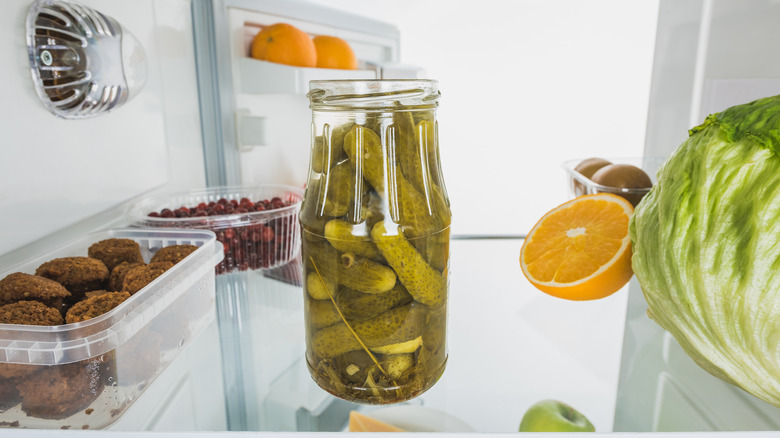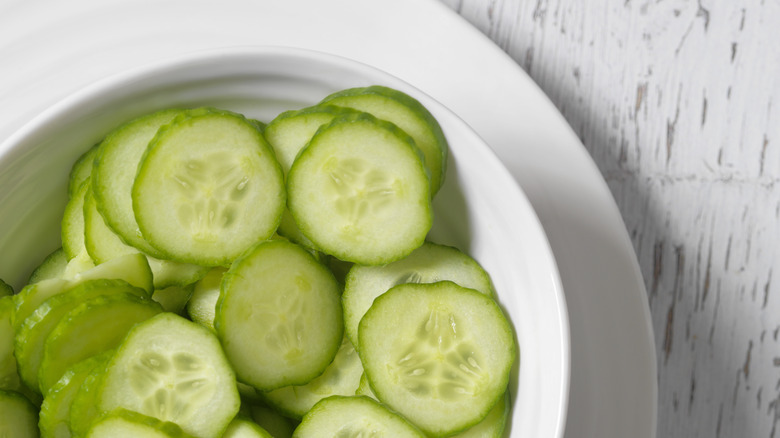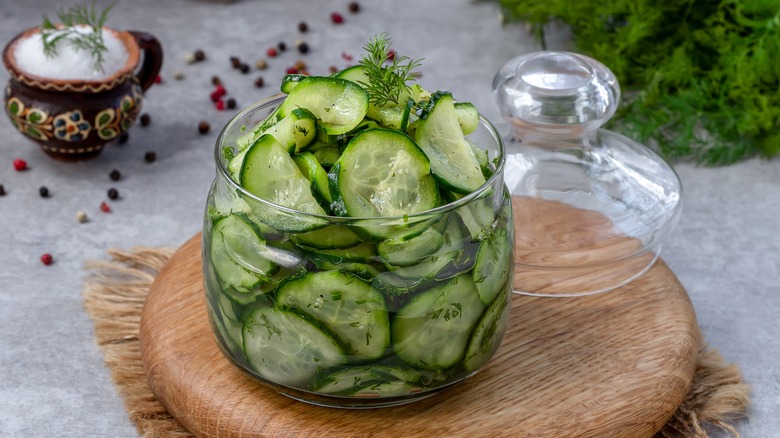Storing Pickles In The Freezer Just Isn't A Good Idea
The impulse to try and freeze pickles is completely understandable, especially if they're homemade. After all that effort into creating these delicious and crunchy snacks, the fact that they only last three or four weeks can seem unfair. In the modern age of personal food storage, it's tempting to think that your freezer can preserve just about anything so you can enjoy it later on.
However, the unfortunate truth is that storing pickles in the freezer just isn't a good idea. While it will successfully extend their shelf life, they'll thaw into mushy little things with none of the crunch you were looking forward to. It mostly has to do with the fact that freezing entails the formation of ice crystals inside any frozen food.
As you might know, from burst pipes in the winter or any unfortunate freezer accidents, water tends to expand as it freezes. When the moisture inside a pickle is frozen, it turns into ice crystals that expand and compromise the structure of the pickle in the process.
Freezer pickles are the exception that proves the rule
Here's where it gets interesting. This texture-ruining process of freezing pickles can actually be used as an alternate pickling method. The twist is that the shredding and rearranging that the ice crystals do is not unlike the breakdown of tissue that fermentation or vinegar causes during traditional pickling.
In fact, making pickles in the freezer only requires a few tweaks to the conventional recipe; otherwise, it involves mostly the same ingredients and processes. The only major additional step to take is that you'll be macerating the cucumbers before placing them in any kind of brine or pickling fluid.
The maceration draws out excess moisture in the cucumbers, making sure this freeze-pickling doesn't over-pickle with too many ice crystals. This step is also why it's recommended that you cut the cucumbers into thin slices instead of long strips. Increasing the surface area helps the maceration draw out the moisture.
Beyond that, it's just a matter of following freezer safety rules as you would with any other kind of food. Use a freezer-safe container, leave enough room for the liquid to expand as it freezes, and make sure to label everything with name and date to avoid confusion later on.
Things to keep in mind when making freezer pickles
The best thing about freezer pickles is that they're just as versatile and customizable as regular homemade pickles. Not to mention that, because they're made in the freezer, they can be kept in the freezer and enjoyed at your pace without over-worrying about spoilage.
One important thing to keep in mind as you explore freeze-pickling is that you don't always want to follow recipes exactly, no matter how delicious they seem. Many freezer pickle recipes will involve adding sugar or syrup of some sort, and while this does create a delightfully crunchy and sweet snack, it does affect the freeze-pickling process somewhat.
Unfortunately, sugar lowers the freezing point of anything that it gets mixed into. If you add too much sugar to the mixture, you might end up partially compromising the pickles' ability to freeze and stay fresh in the freezer. If you're adding a bit of sweetness to your batch of freezer pickles, make sure to keep it as minimal as possible to avoid any issues.


